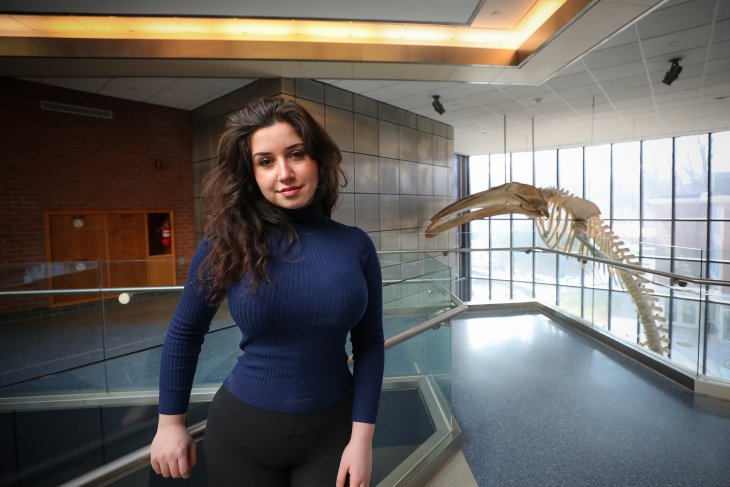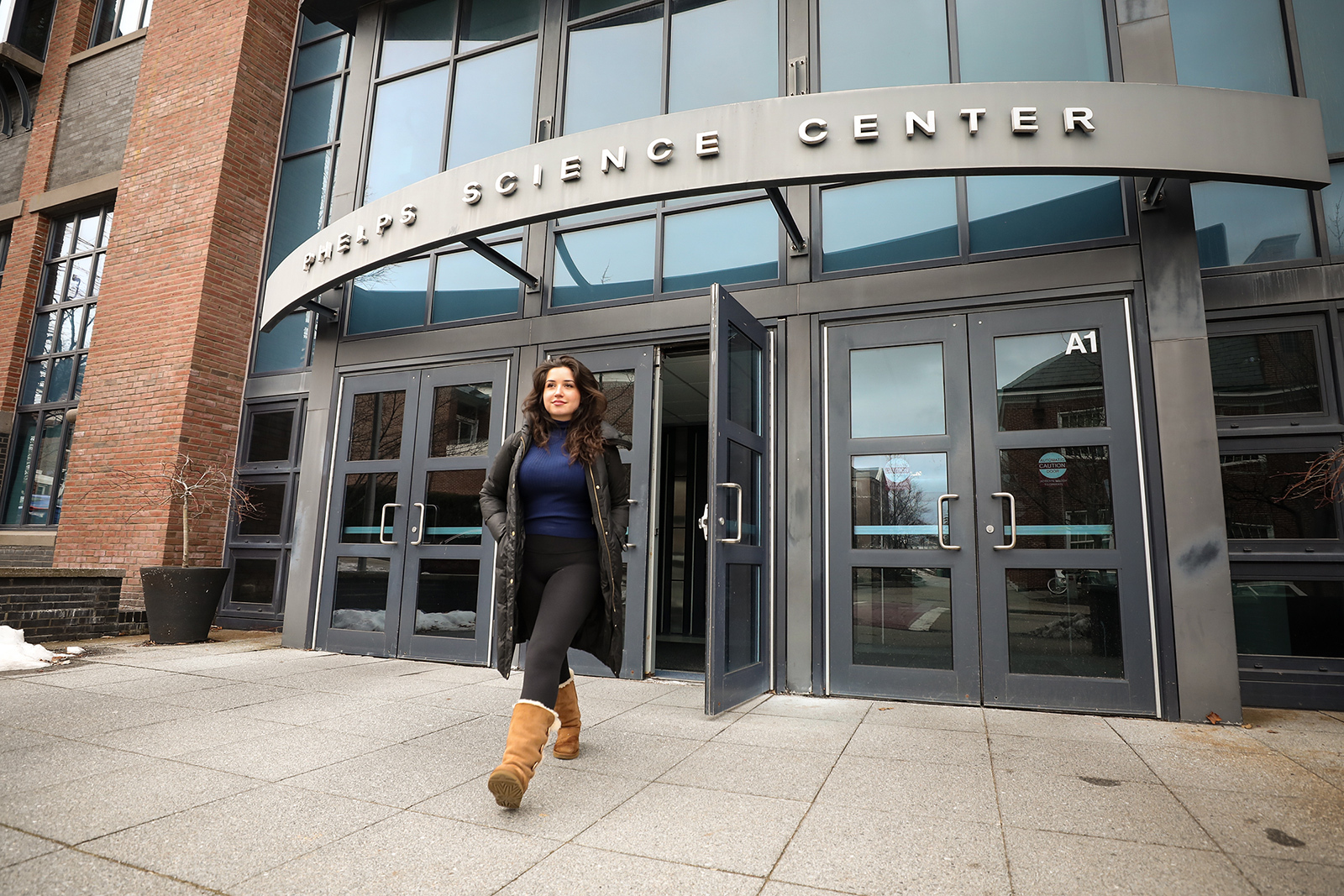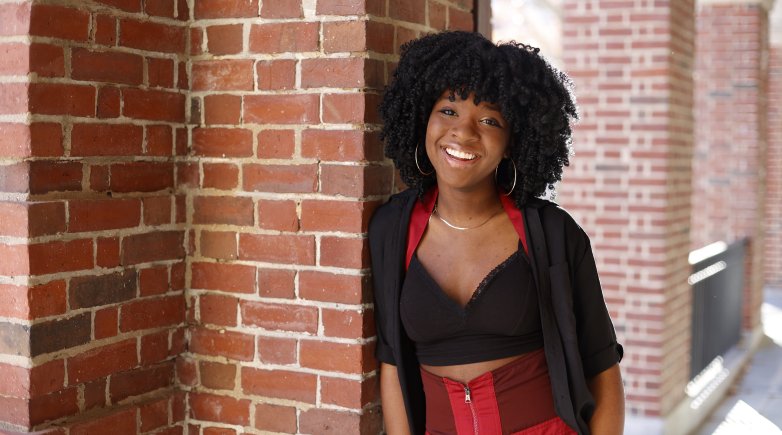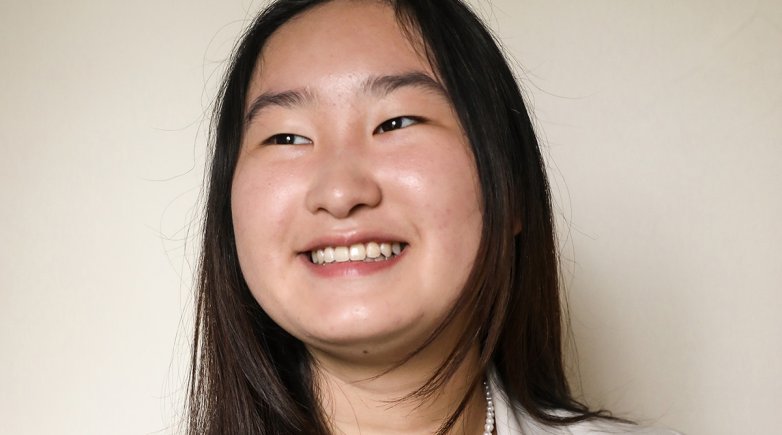Parmis Mokhtari-Dizaji

“I really value a place where there are students from all sorts of different backgrounds, with a similar drive to make good in the world.”
Parmis Mokhtari-Dizaji ’24 likes a challenge. When an email popped into her inbox about the Harvard Science Research Conference, a selective two-day event for high school students, she impulsively applied and was accepted. At the conference last October, her team won an “Innovation Award” for their proposed use of artificial intelligence to reduce restaurant food waste.
Innovation is right on brand for Mokhtari-Dizaji, as is a desire to tackle some of the world’s thorniest problems. “If I had to come up with a tagline, it’s innovative design, empowerment and advocacy,” she says.
The daughter of Iranian immigrants, Mokhtari-Dizaji grew up in Boston, and serves her city as a member of the Mayor’s Youth Council. She came to Exeter as a new lower, drawn by the Academy’s diversity and its ethos of non sibi. “I really value a place where there are students from all sorts of different backgrounds, with a similar drive to make good in the world,” she says.
Her own drive to make good led Mokhtari-Dizaji to found the nonprofit Circle of Bricks, which raises funds to donate Legos to schools in Boston, Memphis and Milwaukee — with plans in the works for an Exeter-based branch. She got the idea while she was still isolated at home during the early months of the COVID-19 pandemic. “A lot of organizations were helping with basic necessities like food, water and shelter, but I thought providing play was especially important when these kids were stuck at home,” she says.
Mokhtari-Dizaji also works with the Global Design Initiative for Refugee Children, another Boston-based organization that designs and builds play spaces for children worldwide. She got an up close and personal view of the importance of such efforts last summer, when she and fellow Exonians traveled to Berlin as part of a Global Initiatives program focused on social entrepreneurship. While helping build benches in an apartment complex where a group of refugees was living, Mokhtari-Dizaji overheard some children speaking the language she speaks at home.
“Just seeing their faces when I responded and they saw that I could speak [Farsi] too,” she recalls. “Kids are so resilient…and so vulnerable, especially in a situation when you don’t know what’s coming next. That conversation sparked something in me, and it was probably one of the best days of my life.”

At Exeter, Mokhtari-Dizaji appreciates how “class goes beyond the classroom,” whether it’s experimenting in the Design Lab or co-founding a Core Values Project, “Our Stories Through Poetry” that helps students express their identity through writing. She has seen her own confidence in writing grow, serving as a proctor in the school’s Writing Center and submitting her own work for recognition in the Scholastic Art & Writing Competition. At a recent Model United Nations conference held at Harvard, she and her partner, Harry Clark ’25, represented the country of Latvia in a committee discussing the international impact of sanctions. The pair was awarded “Outstanding Delegate” honors after rapping their speech and presenting a working paper in the form of slam poetry.
Though she says Exeter has improved her time management skills, Mokhtari-Dizaji admits to wishing she had a couple of extra hours in the day to get everything done. She tries her best to do homework in pockets of time during the school day, leaving nights and weekends free for club commitments or hanging out with friends. “People are surprised to know that I go to sleep at 9:30 or 10 every night so that I can wake up earlier,” she says. “I'm more of a morning person.”
Mokhtari-Dizaji loves her dorm, McConnell Hall, but says she made some of her closest Exeter friends after joining the steel-drum ensemble, led by Music Instructor Marcus Rabb. She plays the double second pan, a low-pitched drum that helps keep the beat for the ensemble. “I love seeing people's reactions when they ask what instrument [I play], and I say steel drums,” she says with a laugh. “They can't see it coming.”


